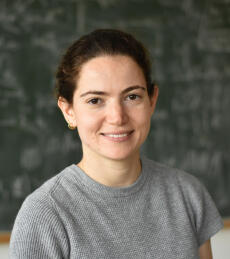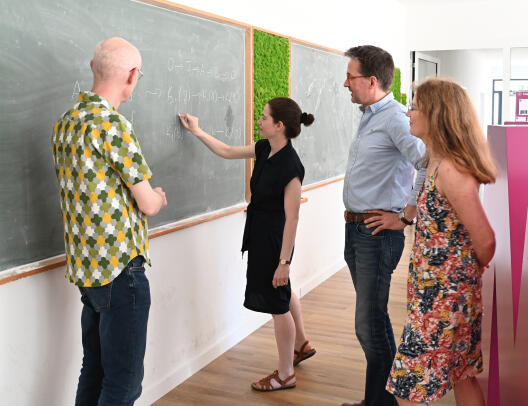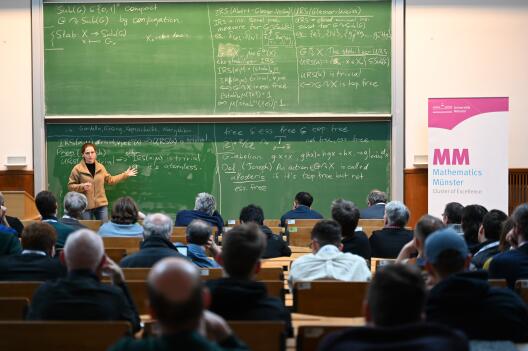Professor Dr. Shirly Geffen

Prof. Dr. Shirly Geffen investigates the fine structure of operator algebras, with a particular focus on the regularity properties of entangled products of C*-algebras with amenable group actions.
Since 2024, she has held a permanent professorship at the University of Münster. In this interview, she shares how she discovered her research field, how her academic path led her from Israel to Münster, and what she finds particularly beautiful about mathematics.
Can you please describe your main research interest?
Shirly Geffen: I work in the field of operator algebras, and more specifically, C*-algebras. They can be associated to different mathematical objects. And most interesting for me are these C*-algebras which are coming from groups and group actions. So one has a group action on a topological space and to this dynamical system, one can attach a C*-algebra. I'm interested to see what C*-algebraic properties one can conclude then from the properties of the dynamical system.
When did you discover this field for you? Already during your studies?
Yes. I was still a bachelor student when I first encountered topics related to C*-algebras. I was introduced to them by a lecturer, Ilan Hirshberg, who later became my supervisor. He was essentially leading the academic year I was in, teaching most of the core courses relevant to C*-algebras, such as measure theory and topology. I once asked him about his research, and that was my first real exposure to the field. I found it fascinating and started exploring it on my own. Later, I continued working in this area with him as my supervisor for both my master’s and PhD.

And during your studies, had you already decided to pursue a career in mathematics and become a researcher?
I’m originally from Israel, and I actually began my studies quite early. Typically, we serve in the army before starting university, but I did it the other way around. Fortunately, I was able to continue studying without interruption, and I feel very lucky to have had that opportunity from an early stage. After three years of studying mathematics, I knew I wanted to continue in academia. At that point, I had the option to either pursue a separate master’s degree or to enrol in a direct master’s-to-PhD track. I chose the direct track, which is usually more suitable if you’re already certain that you want to stay in research long-term.
How did the joint supervision between Israel and Münster come about?
At Ben-Gurion University in Israel, the operator algebras group was very small. When I started, it was essentially only my supervisor, Ilan Hirshberg, and Daniel Markiewicz working in that area. Hirshberg recommended that I go to Münster and suggested setting up a joint supervision. At the time, he had a joint grant with Wilhelm Winter, which made it possible to co-supervise a PhD researcher.
I knew nothing about Münster back then, but I agreed to the joint programme – and it turned out to be a very important decision. In fact, I think it was one of the most significant turning points in my academic career. It opened the door for me to become part of such a strong and active research environment in operator algebras.
So my PhD became a joint supervision between the two universities. I spent about half my time in Israel and half in Münster – typically coming to Münster every second semester for around two months at a time. It was quite intensive in Münster, with lots of activities, seminars, and collaborations that started almost immediately. In contrast, the time in Israel was quieter, which gave me space to think deeply and focus on research. It worked out really well in the end. My family is in Israel, so it was also important for me to be able to visit regularly. The entire programme lasted five years.

What was your next station?
After my PhD, I was accepted for a one-year postdoctoral position in Leuven, Belgium. That was also a very important experience for me, as it exposed me to a slightly different area of research. Within operator algebras, one could roughly divide the field into two main directions: von Neumann algebras and C*-algebras. Unfortunately, these areas are not always closely connected, even though they share deep conceptual links. In Leuven, the focus was more on von Neumann algebras, so I had the opportunity to learn a lot in that direction. They have a very strong research group there, and it broadened my perspective significantly.
And then you returned to Münster for an assistant professorship position in 2022?
Yes. I had already had a very positive experience in Münster, and the group working in operator algebras – which closely aligns with my research interests – is based here. So I was really keen to return, and I was fortunate to be selected for the MATHRIX Assistant Professorship Programme.
Although it was a new position, the start felt very smooth. I was glad to see that several researchers who are natural collaborators for me had joined the operator algebras group, and we quickly started working together. That collaboration soon resulted in a paper, which I’m very happy about.
After two more years, I was incredibly lucky to be offered a permanent professorship at the University of Münster. Honestly, I never expected to receive such a position at my age.
You’re not only active in research but also in teaching. In the winter term 2022/2023, you even received the Teaching Award of the Student Council of the Faculty of Mathematics and Computer ("Lehrpreis"). What role does teaching play for you?
I really enjoy teaching. I see it as an essential part of my work. It gives me a lot of satisfaction and often brings me back to how I felt when I first encountered these concepts myself. I try to keep that perspective in mind when I teach: to explain things in a way that would have helped me as a student.
What advice would you give to students who are considering an academic career?
For me, it was very important to attend conferences and visit different places, especially during my Master’s and PhD. I went to many conferences early on, and that helped me to get to know the mathematical community better – to understand what people were working on and what kinds of opportunities existed. I think that kind of exposure is really valuable.
Last question: What is the particular beauty of mathematics for you?
First of all, I think mathematicians enjoy a high degree of freedom. We can often decide quite independently what we want to work on and how deeply we want to explore a particular topic. No one tells you what to study or how to approach it, and that freedom is very important to me.
In operator algebras specifically, I feel there are so many directions to explore. The field is deeply connected to areas that are already familiar from undergraduate studies, such as topology and measure theory. In that sense, it brings together many different parts of mathematics.
published: 08/2025
Interview by Victoria Liesche

